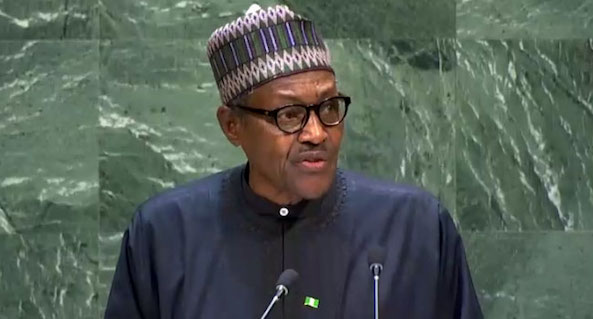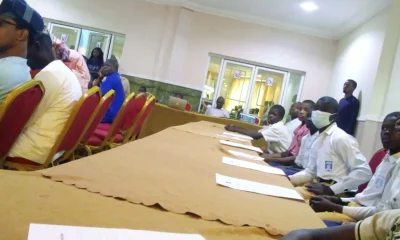Environment
Nigeria’s Proximity to Sahara Desert Worsens Climate Challenges

By Mathew Dadiya, Abuja
President Muhammadu Buhari Friday, in New York gave some insights into the severe climate challenges confronting the country attributing it to the country’s nearness to the Sahara desert.
Speaking at a meeting with the Nigerian Youths Climate Group shortly before his departure for Abuja at the conclusion of his engagements on the sidelines of the 74th Session of the United Nations General Assembly (UNGA74), the President said:
“Nigeria is a neighbour to the Sahara Desert; Lake Chad is shrinking while population is exploding.
It’s a challenging situation. With less land, less rainfall, these are very unique problems for the country.”Presidential spokesman, Femi Adesina stated that Buhari lauded the youths for representing Nigeria at UNGA as Climate Change Champions, adding, “It is good you are participating so that you can appreciate the problems older people are having.”
According to Esther Agbarakwe, one of the leaders of the youth group, “This is the first time we are seeing a President sit with us. It gives us hope. We young people understand the problems, and are in the vanguard of advocacy. The United Nations Development Programme (UNDP) Climate Change Department works with us for solutions.”
She also commended the support the group is receiving from the UN Deputy Secretary-General, Amina Mohammed and the Ministry of Environment, stressing, “We are in it together.”
On his part, Hamzat Lawal, also one of the leaders of the group, thanked President Buhari for signing the Not Too Young to Run Bill into law.
According to him, “We seek solutions to problems in the Sahel region. If we provide solutions to the Sahel, the world will be at peace. You have announced planting of 25 million tress and we youths plan to match it.”
Environment
Prolonged Public Holidays Come with Negative Economic Effects on Citizens – Anambra Residents

Anambra residents have slammed the additional day approved by the Federal Government for the Muslim faithful to celebrate the 2024 Eid-Ei-Fitr, saying this will have negative effects on the economy.
The Federal government had early declared April 9 and 10 as Muslim-Ummah for the successful completion of a month’s spiritual rejuvenation.
Reports says that residents of Anambra capital city believe that the additional day which they did not plan for will result in economic hardship to the citizenry.
Most respondents believe that people had planned to resume their economic activities instead of wasting their time staying at home doing nothing..
Former Chairman, Awka Chamber of Commerce, Chief Felly Akosa, described the additional day to the two days approved earlier as “unfair to the economy of the country as people were unprepared for the additional day.
Akosa said that although it is right for the Muslim faithful to celebrate their holiday after a month-long fasting, the process needs to be carefully planned for in place of the additional rest day which could inhibit business activities.
Chief Damian Okeke-Ogene, National Vice President of Igbo Apex Social Cultural body, Ohanaeze Ndigbo, said the policy would cause huge economic waste as businesses are put on hold,
He advised that, in future, a proper and well planned programme needs to be in place before declaring a public holiday for any celebration that will be national.
“Our economy and other sectors are not very healthy,” and it would, therefore be appropriate to plan well to avoid declarations that will hamper the citizens’ welfare.
Mazi Christian Beluchukwu, a business man in Awka, described the extension of the Eid-El-Fitr public holiday to Thursday, April 11, as an added hardship for the citizenry.
Beluchukwu said that any public holiday for three days, April 9 to 11, to celebrate any feast in the country is an economic loss to the nation.
He said that it was best to stick to the two-day national public holidays as this gives room for the people to plan their activities very well.
He stated that his wife went to a public hospital on Tuesday and was unattended to because there was no doctor on seat to provide medical attention.
“She resorted to visiting a private hospital which cost extra money which the public hospital is expected to handle at a reasonable cost. (NAN)
Environment
World Bank Fund: Corporation Rehabilitates Treatment Plant, Reticulation in Jos South

The Jos Water Services Corporation (JWSC) has said that the World Bank fund received would be used to boost water supply to Bukuru and environs in Jos South Local Government Area.
Mr Apollos Samchi, the Managing Director of the corporation, said that N1.7 billion would be expended on the rehabilitation of water treatment plant, over head steel tank and laying of pipes to homes of consumers.
Samchi, who disclosed this on Friday in Jos, during a two-day capacity building workshop, said that the projects were expected to be completed in four months.
Reports says that the workshop organised for contractors has at its theme: “Implementation of Environmental and Social Management Plans for Projects in Jos South.
The MD said that the projects would ensure steady provision of potable water to residents in Gyel and Kurgiya in Jos South Local Government Area.
He said the treatment plant when rehabilitated would pump out 5,000 cubic litres of water daily.
The MD further stated that the reticulation exercise would cover residents who weren’t initially connected to public water supply in the area.
Samchi said that the essence of the workshop was to ensure that the contractors were trained to develop adequate measures and controls to minimise and mitigate potential environmental and social risks that could adversely affect the project implementation.
He called on all the contractors handling the projects to ensure that they adhered to the environmental and safety standards and deliver within the specified timeframe.
In his remarks, Mr Jonathan Malann, the Plateau Project Coordinator, Sustainable Urban, Rural Water Supply, Sanitation and Hygiene programme (SURWASH), also advised contractors to adhere to the environmental and safety standards as provided by the World Bank.
The Federal Government had received $700m financing from the World Bank to ensure that all its people have access to sustainable and safely managed WASH services.
The seven participating states are Plateau, Delta, Ekiti, Gombe, Imo, Katsina, and Kaduna.(NAN)
Environment
Erosion Control Project: Gombe SEC Approves N389m Compensation for Residents

The Gombe State Executive Council (SEC) has approved payment of N389 million as compensation for residents that would be affected by the gully erosion control project at Federal College of Education (FCE) Technical and its surrounding communities.
The Commissioner for Finance, Gombe State, Malam Mohammed Magaji, stated this at the end of the SEC meeting on Friday in Gombe.
Magaji said the payment, which would commence immediately, would be for individuals and organisations along the gully erosion site.
He said almost 1000 persons were expected to benefit from the gesture.
According to him, the compensation is part of the requirements of the World Bank, which specifies that such payments be made to property owners.
Magaji said the payment would also be made to ensure seamless resettlement of affected persons.
“The beneficiaries are in hundreds, almost a 1,000 people; there is compensation for houses, and also for business premises.
“There is also stipends for the elderly living around that area so that they are able to have good livelihood,” he said.
The commissioner for Education, Hajiya Aishatu Maigari, also said the SEC approved upgrade of the five mega senior secondary schools in the state to sustain improvement in the education sector.
Maigari said the upgrade would be carried out based on the needs of each of the schools.
She stated that infrastructure in some of the schools were already being upgraded to global standards.
“We have seen construction of toilets, installation of solar-powered light, construction of roads, school clinics, boreholes and many more,” she said.
The News Agency of Nigeria (NAN) reports that the state government had on Nov. 23 signed a N12 billion contract with Triacta Nigeria Ltd. for a 21-kilometre gully erosion control work in six communities within Gombe metropolis.
The project is under ACRESAL project, a World Bank-assisted project to address the challenges of land degradation and climate change in northern Nigeria. (NAN)



























